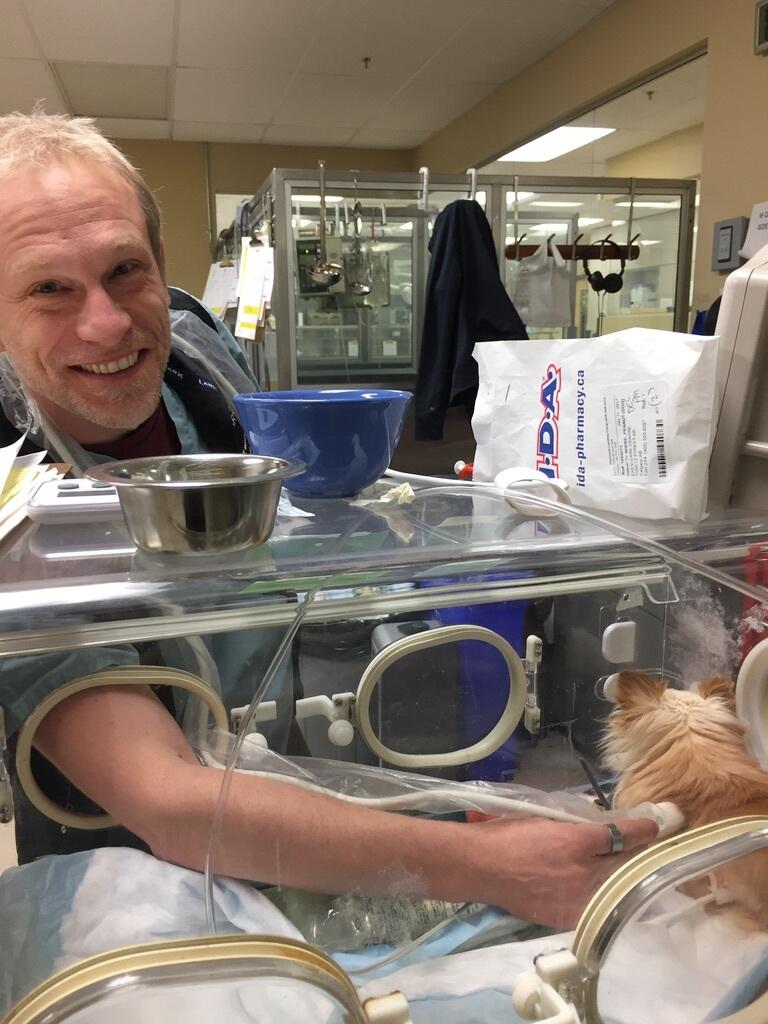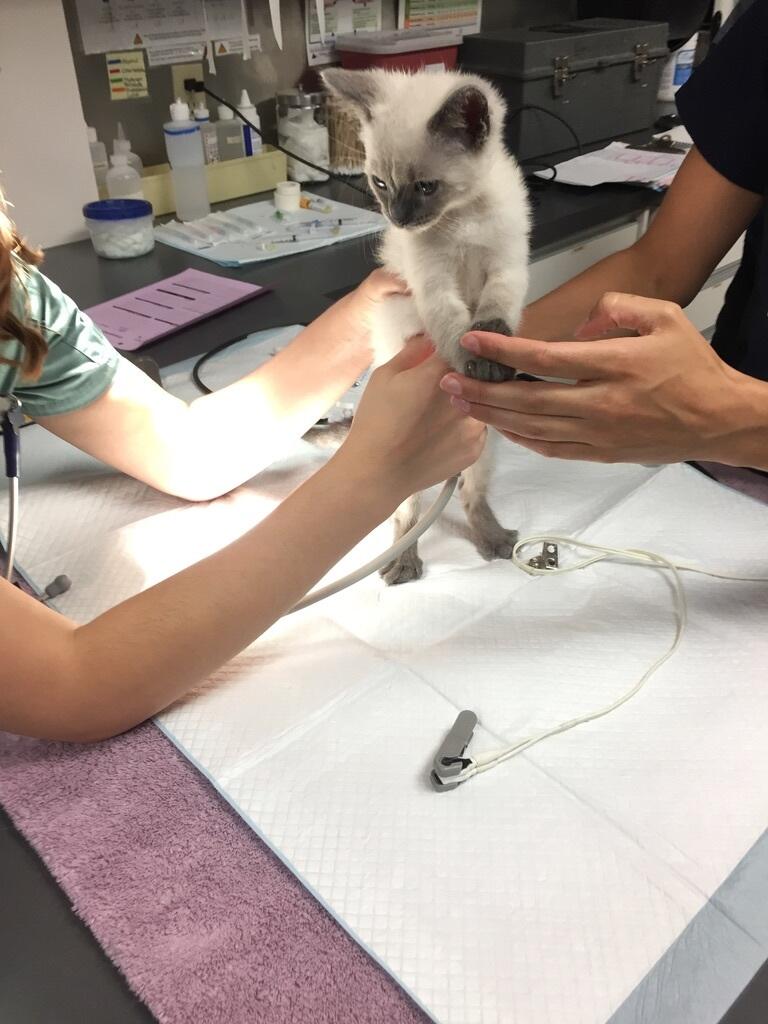April 17, 2024
UCalgary Companion Animal Health Fund accelerates pioneering veterinary-medicine research

Your dog is struck by a car. Rushed to the nearest animal hospital, Fluffy is in shock — blood pressure low, heart rate high, and he’s struggling to breathe.
Unstable, he receives oxygen, intravenous fluids and pain medication. Internal injuries are a given, but the specifics are unknown.
To better assess the damage, Fluffy is disconnected from vital monitoring — which halts resuscitation efforts — in order to be wheeled over to the emergency department’s X-ray machine, where he needs to be held in place for an accurate radiograph. This ordeal is stressful and your pet may not survive, no matter what the X-rays ultimately reveal.
Just 20 years ago, this was often how an emergency visit to a veterinary hospital played out. Now, thanks to technological advances and research-backed education, much of it developed or refined at the University of Calgary, the process has been greatly improved.
Veterinarians, thanks to state-of-the-art training and access to new technology, are making a difference. Hand-held ultrasound machines can be brought to the patient, ensuring care is not interrupted and resuscitation can continue while vital information — such as the intensity and location of internal bleeding — can be identified and treatment delivered as quickly as possible.

Søren Boysen with a patient.
Courtesy Søren Boysen
“I can answer multiple clinically driven questions within seconds to minutes, without changing the patient’s position, without restraint, while everybody’s still doing everything else around that patient,” says Dr. Søren Boysen, DVM, a professor at UCalgary’s Faculty of Veterinary Medicine (UCVM).
“We don’t compromise patient safety at all and can rapidly assess the lungs, pleural space, abdomen, heart, and numerous other organs and structures for life-threatening injuries within minutes of arrival.
“It’s changed the practice of companion-animal medicine and saved countless lives over the years.”
In this area, Boysen is an expert, publishing the first paper on the application of point-of-care ultrasound in small animals more than 20 years ago. And, thanks to the Companion Animal Health Fund (CAHF) at UCalgary, established in 2008, his graduate students are able to continue the critical work.
Giving Day featured fund appeals to pet owners
“CAHF is crucial not only in fostering cutting-edge research and creating employment opportunities for students at the University of Calgary, but it also underlines our commitment to enhance the health and well-being of our cherished pets,” says Sarah Parker, UCVM’s director of development.
“Our goal is to grow this fund — enabling us to conduct even more innovative and important research.
“We invite pet owners and animal lovers to help us achieve this goal on Giving Day.”

UCVM students conduct an ultrasound on a patient.
Courtesy Søren Boysen
CAHF is one of the faculty’s featured funds for UCalgary Giving Day, which runs until April 18. Since its 2017 launch, the university’s annual fundraising blitz has helped to generate more than $10 million in donations, including last year’s $2.5 million from 2,600 alumni, students, faculty, staff and friends.
Boysen, armed with research-validated know-how, is in demand. Freshly returned from the Romanian Veterinary Emergency and Critical Care Society conference, his future includes trips to Australia, Colombia, Sweden and Italy, where he’ll train general-practice veterinarians to use point-of-care ultrasound.
“Now we’re going to say, ‘Don’t take my word for it — here’s the research from (CAHF) funding that shows what you can expect to find when you put an ultrasound on a cat or dog coming through emergency,’” he says. “Now I’ll have the evidence to back it up.”
Beyond cats and dogs
In addition to emergency ultrasound studies, CAHF impacts an exciting array of UCVM initiatives.
When Dr. Daniel Pang wanted to delve deeper into anesthesia-related research, CAHF support allowed him to acquire 10 bearded dragons — all juveniles, all in perfect health, all from the same breeder — to study sedation in reptiles, an underexplored area of veterinary medicine.
“This funding was instrumental,” says Pang, PhD, a UCVM professor. “There’s absolutely no debating that.”
He can soon relay his findings — how the lizards’ unique physiology is affected by anesthesia — to veterinarians in the field. “The whole project is meant to be as practically useful as possible,” says Pang, who, with PhD student Renata Pinho, began the research in January.
“We’re not five steps removed from what they can apply in their clinic. Hopefully, they can take the information we gather and start using it right away.”
At the conclusion of the non-invasive study, the bearded dragons will be put up for adoption, says Pang, “because they make good pets.”
CAHF funding is also bolstering Pinho’s investigation of veterinary anesthetic safety, a project related to her doctoral thesis. Pang, her adviser, says finding support for something like this is extremely difficult. “CAHF is really the deal-breaker as to whether this kind of work can go ahead.”
One immediate result of Pinho’s research: Noting that one drug company was packaging different medications in a similar fashion, creating look-alikes and increasing the risk of confusion. The makers, when approached, addressed the issue.
“We have a chance to learn about the errors right now,” says Pinho. “The motivation is to provide more safety to our patients and to the welfare of our professionals.”
UCalgary Giving Day is April 18. Whether you support research, student awards or another one of UCalgary’s innovative funds, your gift will help change lives and shape the future. Eligible gifts made from April 4-18 will be matched, up to $2,500 per gift, per fund — but only while matching funds last, so be sure to give early! Make your gift today at ucalgary.ca/givingday.







